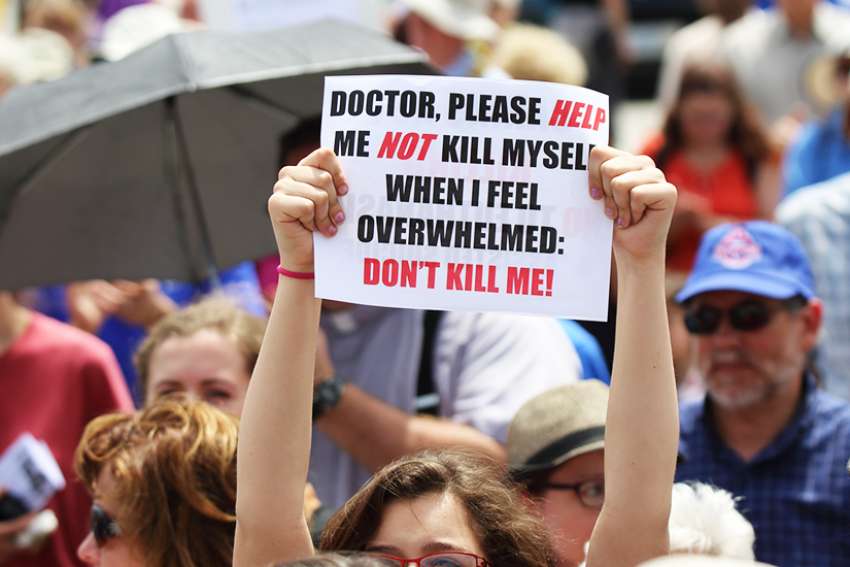The judges found that while objecting doctors may have to change the way in which they practice medicine, by switching to hospital or group-based practice or by practicing in areas unlikely to elicit a request for assisted suicide such as sports medicine, the policy does not banish them from medicine.
Register file photo
Doctors who object to assisted suicide must give referrals, court rules
By Michael Swan, The Catholic Register
A doctor’s conscience takes a back seat to a patient’s right to have medical procedures such as assisted suicide and abortion, Ontario’s Divisional Court ruled Jan. 31.
The three-judge panel unanimously rejected an attempt by the Christian Medical and Dental Society of Canada (CMDS) to quash a requirement of the College of Physicians and Surgeons of Ontario (CPSO) that states doctors who morally object to abortion, assisted suicide and other legal-though-controversial medical procedures must provide an “effective referral” to doctors to will provide the service.
Weighing the infringement on religious freedom rights against the policy objective of ensuring equal access for patients seeking an assisted death, the judges found that the rights of patients outweighed the rights of objecting doctors.
“The court decision is a win for patient access to health services in Ontario,” said a CPSO press release.
The CMDS hasn’t yet decided whether to appeal and will likely make that decision in the next couple of weeks, said CMDS executive director Deacon Larry Worthen.
Worthen was left shaking his head by how often the judges agreed with arguments the CMDS made, but in the end decided against them.
“The court acknowledged that there was no evidence of the fact that conscientious objection had affected access one iota in Ontario,” he said. “So this was a solution to a problem that didn’t exist.”
Any appeals that may be launched could have been avoided if the CPSO had sat down with objecting physicians and included them in the process for designing its policy, Worthen said.
“It’s not the best policy outcome at all. I really believe that if they (CPSO) had been willing to sit down and acknowledge our constitutional rights in the beginning, we would have been able to find a way to ensure access while at the same time protecting conscience rights,” Worthen said. “This is not a zero-sum game. It’s possible to have a win-win scenario here in which both things are allowed. This type of situation, where they acknowledge that our rights have been violated and yet we’re still required to do something against our will, sounds more like some kind of autocratic regime than it does democratic Canada.”
CPSO spokesperson Kathryn Clarke points out that the judges found the policy had tried to accommodate religious objections.
“The requirements (of the effective referral policy) impair the individual applicants’ right of religious freedom as little as reasonably possible in order to achieve the goal (of equitable access to health care).
The alternatives proposed by the applicants would compromise the goal of ensuring access to health care in many situations, often involving vulnerable members of our society at the time of requesting medical services,” the judges wrote.
The judges found that while objecting doctors may have to change the way in which they practice medicine, by switching to hospital or group-based practice or by practicing in areas unlikely to elicit a request for assisted suicide such as sports medicine, the policy does not banish them from medicine.
“The deleterious effects of the policies, while not trivial, are less serious than an effective exclusion from the practice of medicine,” the judges wrote.
Where the CMDS had argued the case involves only the religious freedom rights of doctors under section 2.a of the Charter of Rights and Freedoms, the judges found they must weigh those rights against an implied right of Canadians to equitable access to legal medical services.
“The positive effects associated with the effective referral requirements of the policies are significant, while the impact on the individual applicants, while not trivial, does not extend to deprivation of the ability to practice medicine in Ontario although it may require an accommodation on their part,” the judges said.
The CMDS argument that the policy effectively discriminates against Christian doctors with serious ethical or moral concerns was also dismissed.
Please support The Catholic Register
Unlike many media companies, The Catholic Register has never charged readers for access to the news and information on our website. We want to keep our award-winning journalism as widely available as possible. But we need your help.
For more than 125 years, The Register has been a trusted source of faith-based journalism. By making even a small donation you help ensure our future as an important voice in the Catholic Church. If you support the mission of Catholic journalism, please donate today. Thank you.
DONATE

